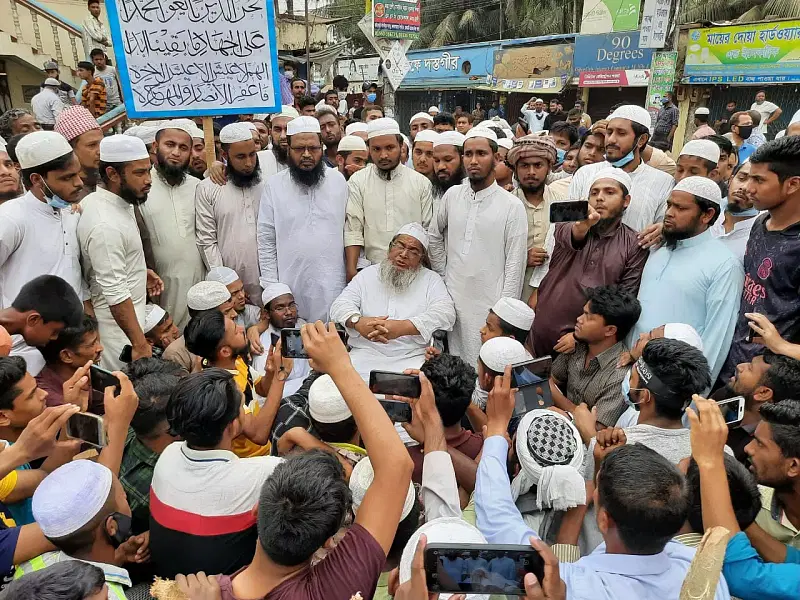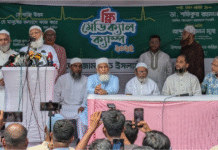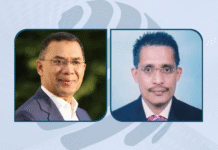Prothom Alo

The question has arisen as to whether the stern stance adopted by the government against Hefazat, after the latter’s violent outbursts in Brahmanbaria and Hathazari, is a matter of principle or a strategic stance. From an ideological standpoint and on principle, it is hardly credible that Awami League can have any sort of understanding or dialogue with Hefazat. The organisation Hefazat-e-Islam was launched on 19 April 2010 with its movement against the women’s development policy and the education policy declared by the Awami League government.
In a democratic country, anyone can oppose any policy and even try to mobilise public opinion to that end. But no one has the right to apply pressure to remove the fundamental principles of the constitution and forcefully replace this with other views or decisions. But Hefazat does not recognise the laws of the land or the constitution. There 13-point demand does not have a single component that can be acceptable by a democratic and modern state.
After the 5 May 2013 siege at Shapla Chattar in the capital city, the government came down hard on Hefazat. Many leaders and activists of Hefazat were arrested. Cases were filed. And then we saw that no headway was made with the cases. The arrested leaders were released on bail, one after the other. So the present arrests of Hefazat leaders and the revival of old cases do not prove any actual change in the government’s stance.
The bottom line is, the government had adopted double standards for Hefazat. According to a Prothom Alo report, the government decision makers are now determined to bring Hefazat under control, the organisation which they were so desperate to appease in the past. They want to put a trusted leadership in place to keep the organisation by their side as in the past. As part of this endeavour, Hefazat men are being arrested and pressurized, and efforts are also on to create a rift in the organisation. The government apprehends that if a leadership of its choice is not installed at the helm of Hefazat, it may spiral out of control in the days to come. That is why the government wants to usher in Anas Madani, the son of the late Hefazat amir Shah Ahmad Shafi, and his followers, to the organisation’s leadership. But there are also quarters within the government that say neither Anas Madani not Babunagari can be entirely trusted. The strict stance must not waver.
After the textbooks for Class 7 and Class 8 were published, the national curriculum coordination committee noticed that two items of which Hefazat disapproved had not been dropped. Around 1.5 million copies of the books had been published, but those were cancelled and trashed
Prothom Alo reports also revealed that during the crackdown on the Shapla Chattar siege in 2013, the Hefazat amir Shah Ahmad Shafi had been holed up in the Lalbagh madrasa in Dhaka. It was there that the government made inroads to a section of Hefazat’s leadership. After that, government officials of various levels held meetings with Hefazat leaders at the Hathazari madrasa.
Ministers, leaders, supporters and intellectuals of the government camp have the tendency to bracket BNP, Jamaat and Hefazat all together. They insinuate that there three entities are not too different in ideology. But there is a huge difference in the government’s strategy in this regard. It is far more flexible and compromising with Hefazat, in comparison to its tough stance against BNP and Jamaat.
In 2017 the government relented to Hefazat’s demands and changed 29 components in school textbooks. After the textbooks for Class 7 and Class 8 were published, the national curriculum coordination committee noticed that two items of which Hefazat disapproved had not been dropped. Around 1.5 million copies of the books had been published, but those were cancelled and trashed.
The government also gave into Hefazat’s demand and gave recognition to the Qawmi madrasa Dawra-e-Hadith certificate as equal to the Bachelor’s degree of general education. The government needs to supervise all methods of education in the country. It is also the government’s responsibility to ensure that the curricula and books contain no anti-state contents or anything contrary to the constitution. Yet while giving recognition to Qawmi madrasas, the government has been unable to exert itself there. Qawmi madrasa do not hoist the national flag despite the directives in this regard. They reportedly do not sing the national anthem either.
The opposition is the alternative to the government or ruling party in a democratic system. In developed democratic countries, there are shadow cabinets. We might not be able to hope for that in our country, but at least the government and opposition should have some sort of working relationship. There had been signs of such relations during the post-1990 emergence of parliamentary democracy, but then things went awry.
The government could not tolerate the opposition. The opposition also wanted to settle all scores on the streets. So, parliamentary democracy became ineffective. Despite all this, Awami League was viewed as the alternative force during the BNP rule, and BNP during the Awami League rule. But after the 2014 one-sided election, there has been no opposition in the true sense of the word.
There is another noticeable propensity. Whoever comes to power, takes this to be a permanent position. In its 2001-2006 term, had BNP not wanted to ‘destroy’ Awami League, had it not tried to protect the perpetrators of the 21 August grenade attack, then the country’s political trend may have been different. When Awami League came to power in 2009, it declared that it would take important decisions in consultation with the opposition, but in actuality it did quite the opposite. BNP attempted a one-sided election in 2007 but failed. But Awami League successfully did so in 2014. They used the court ruling as a tool to this end as well as their two-third majority in parliament.
In Bangladesh, the two major players – Awami League and BNP – do not follow the rules of the game. And that is why Hefazat comes blustering in with all its bravado
Neither BNP nor Jatiya Party is Awami League’s opposition now – it is Hefazat-e-Islam. If you turn on the television or open the newspapers, it will seem that Hefazat is the country’s biggest party and there is no bigger leader than Junaid Babunagari or Maulana Mamunul Haque. Yet Hefazat claims to be a non-political organisation. No matter what Awami League leaders may say now, they are the ones who have aided and abetted this non-political organisation to take on the status of a political party and have bolstered its strength. They have reportedly provided Hefazat with all sorts of benefits and perks.
Awami League imagines it is in a very advantageous position by driving BNP away from the fray. But, as science maintains, no space remains vacant. That is why Hefazat has taken up the space vacated by BNP. Awami League leaders didn’t realise that by driving away BNP, they were boosting Hefazat’s strength and also weakening their own organisation structure. Awami League is rife with inner conflict and clashes. Faridpur and Noakhali’s Companyganj are not isolated instances.
In the just concluded Indian elections, the West Bengal chief minister Mamata Banerjee told prime minister Narendra Modi, “The game is on!” He replied too, “The game is on!” The winner of the game will be announced on 2 May. But in Bangladesh, the two major players – Awami League and BNP – do not follow the rules of the game. And that is why Hefazat comes blustering in with all its bravado.
* Sohrab Hassan is joint editor of Prothom Alo and a poet. He can be contacted at sohrabhassan55@gmail.com
* This column appeared in the print and online edition of Prothom Alo and has been rewritten for the English edition by Ayesha Kabir










